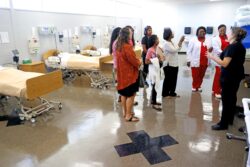Developing the healthcare workforce in Appalachia serves two vital purposes: improving health outcomes and improving local economies.
Over many decades, ARC has played a vital role in bridging the healthcare access gap in Appalachia. As the demand for healthcare workers and health access continues to dramatically increase, we’re proud to support grantees in meeting this critical need.
In 2024, we awarded $10M in POWER funds to healthcare workforce development projects in coal communities across the Appalachian Region.



Launching Healthcare Technical Training in Rural Mississippi
At East Mississippi Community College (EMCC), $877,00 in ARC POWER funds will expand the Practical Nursing program, with the possible addition of an Associate Degree Nursing program. EMCC serves six rural counties in Appalachian Mississippi, and more than 150 students will benefit from the improvements over the next few years.
“EMCC has committed to increasing career technical training opportunities,” said Dean of Institutional Research, Effectiveness, Grants, and Sponsored Programs Susan Baird. “A major reallocation of the campus resources across the entire college is occurring to allow for the addition of more training programs, including nursing and health science programs, that will lead to family-sustaining wages. EMCC’s commitment to expanding programs not only addresses the rate of vacancies due to lack of qualified workers but also empowers underrepresented communities, offering life-changing opportunities for [individuals in coal communities].”
Focusing on Disease Prevention in Eastern Kentucky
More than 575 miles away in Pikeville, Kentucky, the University of Pikeville is working to both address preventable diseases in Appalachia — and grow the region’s healthcare workforce.
Their $2 million POWER project will support the creation of the Appalachian Center for Preventive Medicine. There, undergraduate and graduate students in healthcare fields — from social work to medicine — will collaborate across health disciplines to study preventable diseases in a clinical setting. Together with faculty, they’ll strive to make medical breakthroughs that prevent early mortality in Appalachia.
“The creation of this interprofessional clinic is not just a step, but a transformative leap in advancing preventive health in Eastern Kentucky,” said Executive Vice President & Chief Strategy Officer Lori Werth, Ph.D. “By bringing together students from medicine, optometry, dental, social work, and nursing, we are not only training future healthcare professionals, but we are also fostering a collaborative approach to care. This clinic will empower our community to prioritize prevention, improving health outcomes and addressing long-standing health disparities in the region.”
Specifically, project officials say they are focused on addressing improved cardiac health outcomes for patients in Eastern Kentucky. The new center will serve as a regional hub for advancements in patient-centered preventive medicine and specialized training of healthcare professionals.
Developing Future Nurses in Appalachian Pennsylvania
Nurses often serve as the backbone of healthcare facilities, and demand for qualified nurses continues to rise throughout the region. Recognizing the need to expand Appalachia’s nursing workforce, Saint Vincent College in Latrobe, Pennsylvania, will use $663,000 in POWER funds to establish new Bachelor of Science in Nursing (BSN) and Direct Entry Master of Science in Nursing degree programs.
In particular, officials at Saint Vincent will leverage virtual reality and high-fidelity simulation technologies in its new programs. As the complexity of medical technology increases, so do the needs of educational providers. Saint Vincent also plans to use digital marketing to boost recruitment from underrepresented communities across eight counties in Appalachian Pennsylvania.
“Our new bachelor’s and master’s degrees in nursing are significant additions to our academic offerings. They reflect our commitment to providing our students with relevant and rigorous programs that prepare them for successful careers and meaningful lives,” said President Rev. Paul R. Taylor, O.S.B.
Creating a Healthier Appalachia
Together with other recipients of POWER funding, these three grantees are working to expand Appalachia’s healthcare workforce and access to healthcare in the region. Through focusing on patient-centered preventive medicine and training Appalachians to fill the healthcare workforce gap, these projects have tremendous potential to improve health outcomes in the region.